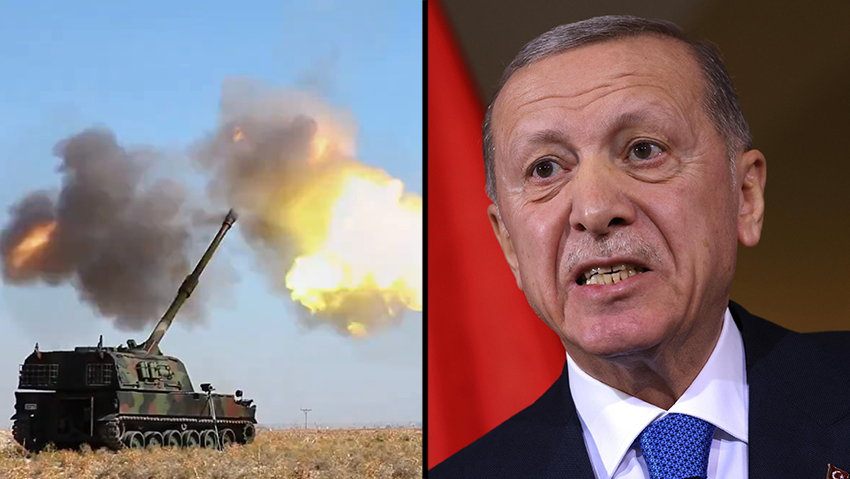Getting your Trinity Audio player ready...
Turkey's President Recep Tayyip Erdoğan has emerged as one of Israel's most vocal critics since the onset of the war. He has urged the Arab world to unite against Israel, claiming that it has no intention of stopping in Gaza and will extend its actions to Turkey.
Erdoğan repeatedly refers to the ongoing war against Hamas as "genocide," even labeling Prime Minister Benjamin Netanyahu as "the Hitler of our time." Meanwhile, Erdoğan continues to carry out ruthless operations against the Kurds in Turkey, Syria and Iraq.
Wednesday marked a new escalation in the already strained relations between Turkey and the Kurdish groups seeking independence. An attack targeted the headquarters of Turkey's aerospace industry company TUSAS in Ankara, resulting in five fatalities and 22 injuries. Videos from the scene circulated on social media. According to Turkish reports, at least two assailants were involved, and they were killed. Turkish Interior Minister Ali Yerlikaya stated immediately after the strike that it was "very likely" that the attackers were Kurdish operatives from the PKK, or Kurdistan Workers' Party, which Turkey designates as a terrorist organization. On Friday, the PKK claimed responsibility for the attack.
Even before the PKK took responsibility, Turkey launched intensive air and ground strikes against Kurdish positions in Syria and Iraq. According to the Saudi newspaper Asharq Al-Awsat, positions of the Syrian Democratic Forces (SDF), which includes a significant Kurdish military component in Syria, were targeted. Turkey's Defense Ministry announced on Wednesday evening that it had attacked PKK targets in northern Iraq and northern Syria: "In accordance with our rights to self-defense, an air operation was conducted against terrorist targets in northern Iraq and Syria. A total of 32 targets were successfully destroyed, and operations are ongoing." Following the events, Erdoğan declared that "no terrorist organization attacking our country will be able to realize its hopes."
According to a report on Sunday from the Syrian Observatory for Human Rights, an organization linked to the Syrian opposition based in London, Turkish forces have intensified their air and ground assaults in northeastern Syria since Wednesday. The report noted that over 100 airstrikes had been conducted, including 84 drone strikes and 18 by fighter jets. Ground assaults also were reported in several areas, resulting in 17 deaths and more than 60 injuries.
The observatory indicated that many civilian homes, oil facilities and factories were damaged in the attacks. Protests against the Turkish escalation were reported in several locations across Syria. Lebanese newspaper Al-Akhbar, associated with Hezbollah, also covered the Turkish strikes, noting that sources on the ground indicated Turkey had conducted over 130 airstrikes across most towns and cities along Syria's northern border within four days. In the targeted areas in Syria, some claimed that Turkey was using the Ankara attack as a pretext to target groups unrelated to the incident.
Syria's media reported that Turkey employed a significant amount of ammunition during these strikes. Turkey's Defense Ministry claimed it was targeting "terrorists," but the reality is that Turkey has long fought against the Kurdish quest for independence, ruthlessly attacking Kurds in Turkey, Syria and Iraq out of fear that the ethnic group might realize its aspirations in the Kurdistan region.
The historical animosity between the PKK and Turkey is not new. The PKK is a Kurdish armed organization founded in Turkey in 1978 by Abdullah Öcalan and Kurdish activists. Initially focused on advocating for Kurdish rights, it later sought independence for southeastern Turkey. In its early years, the PKK was viewed as a political movement, but it is now recognized as a terrorist organization in Turkey and many Western countries, including the U.S.
A report from Saudi Arabia's Al-Arabiya network highlighted significant events influencing the PKK, such as Öcalan's arrest in 1999 and his subsequent life imprisonment. The report noted that the PKK has carried out attacks against the Turkish military and government sites, primarily in southeastern Turkey. The conflict between Turkey and the PKK spans borders, particularly since Turkey accuses the organization of strengthening ties with Kurds in neighboring countries like Iraq and Syria, launching attacks on PKK positions in those states. Efforts to reach a cease-fire between the two sides have repeatedly failed, as Ankara remains firmly opposed to the PKK's demands for independence.
Over the years, there have been numerous reports of connections between Israel and the Kurds, whose population numbers in the millions and spans Turkey, Iraq, Syria, Iran and Armenia. The Kurds have often expressed warm sentiments toward Israel. In Iraq, the autonomy achieved by the Kurds is referred to as the Iraqi Kurdistan.
Get the Ynetnews app on your smartphone:




